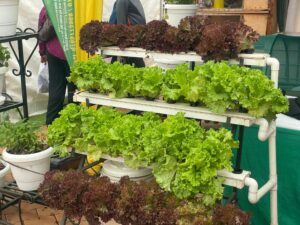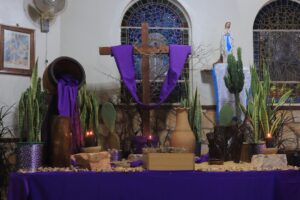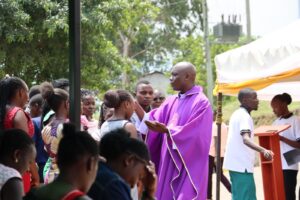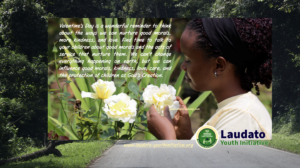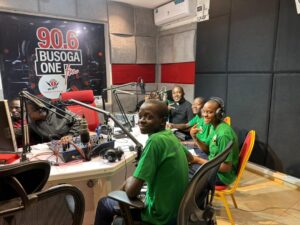By Sarah Kirikumwino | 24 July 2025 – Day two
Sharing stories of hope from the Laudato Si Africa Conference where we are taking days to listen to each other and dialogue on the African approach to Laudato Si, values and the Church’s Role in Integral Ecology. We began by acknowledging the fact that the Church has a big role to play in promoting integral ecology. This takes us to hospitality and peace building, living in harmony with one another is very important as we embrace and receive each other.
In a world where peace and security are no longer guaranteed, where some choose the path of war, the message of integral ecology reminds us that we share one common home. Harmony with nature must begin with harmony among people. The Church is called not only to preach but also to live out the values of hospitality, justice, and reconciliation foundational pillars of integral ecology. As Pope Leo XIV encourages us to build bridges of peace, as young people we believe peace can be attained if listening and dialogue are given priority as a path to solving conflict. This comes with other realities like cultural respect and allowing people have a sense of belonging in their faith and home land I tend to believe. As young people growing up we just need to do more in enhancing our faith to be able to respect human dignity! We recently finished our Laudato Si Festival and our theme was “ Sowing Seeds of Hope and Peace for Creation”. This is a powerful message everyone needs to reflect upon. How do we become sowers of peace and hope for creation? The problems affecting us today many stem from gifts of nature resources that God created to sustain all of us how do we use them without exploiting mother earth and her people?
Stories, Surveys, and Perspectives on Ecology
We analysed and shared on how creativity—through poetry, singing, and storytelling—can be powerful tools for raising awareness in our modern world. One of the more moving reflections described “dancing with forests”, a symbolic gesture that captures the beauty, purpose, and sacredness of nature.
The dialogues emphasized the need to revive collective energy and positivity to protect and conserve the environment in an African conceptual framework in our view as Laudato Youth, most issues become more clear if we look at them in our local setup, analyse the impact of the realities as chapter one of Laudato Si invites us to reflect on what is happening to our common home.
However we were reminded that this is not a solo effort, but a shared journey that demands both heart and hands for action a reality that spoke to our true motto “united for climate action” where Religion/Faith “Unites us” amplifies voices for SDG 13 – Climate Action
Religion, Ethics, and Policy
Religion plays a vital role in ecological conversation, but needs to go hand in hand with culture. Many African communities are rooted in rich indigenous traditions that promote ecology, yet climate dialogue often overlooks these voices. For example at Laudato we look on to the Uganda Martyrs with the rich tradition of the totems that were symbols of ecology. Clans in Buganda and other parts of the Country preserve endangered trees and animals through totems. As Ms Immaculate Kisembo notes in her article – the Legacy of the Uganda Martyrs in Ecological Sustainability
“As the missionaries introduced Christianity to the region, the Martyrs embraced the teachings that emphasized love, respect, and stewardship of creation. They learned that God’s creation was not merely a resource to be exploited but a sacred trust to be cared for. This understanding deepened their commitment to ecological sustainability, aligning their faith with the rhythms of nature”
A key takeaway: climate justice cannot be achieved without cultural justice. Respecting and integrating traditional knowledge systems, spiritual worldviews, and moral values is essential in forming effective environmental policies and practices that are easy for local people to understand and adopt. And we know reaching the grassroots level is where real transformation begins.
Mobilizing Youth for Integral Ecology
We joined the Young people to share our personal motivations for engaging care for mother earth as voluntary activity we undertake to play our role as care takers of the earth even as young people with many limitations our work has always been an act of charity and work of service. Some of us have witnessed the direct impacts of climate change in our communities; others, like myself, grew up from agricultural backgrounds and have been mentored by Holy Cross educators to mobilize and amplify youth voices for mother earth.
As we reflected on the interconnectedness of humanity and ecology, drawing strength from shared experiences and a common mission. At the heart of our work in the Laudato Youth Initiative is a commitment to unite, mobilize and inspire young people to take action. We do this by building awareness through localized programs and transformative tools:
• Formation of Laudato Si’ Clubs in schools, universities, parishes, and communities an approach to uniting in groups that unite young people in purpose but also to impart a value for personal responsibility and its away in which we form ecological citizens.
• Climate action response activities and programs from raising nursery beds to tree planting to growing trees, regenerating efforts and teaching smart agriculture to managing waste we use of digital media to amplify voices for ecological consciousness
• our Laudato Si’ green Festivals that include green walks, liturgical celebrations, are spaces for spiritual renewal and pray for the care of creation, those affected by climate change and raise awareness thus telling stories that promote a spirit of mutual respect for the environment and for one another
The Call to Live Laudato Si’ in more bold ways as we answer the question 10 years of Laudato Si where is Africa?
We acknowledge that Integral ecology is not a theory, it is a lifestyle rooted in ethics, spirituality, and active care for our common home. As young people of faith, we are called to lead with humility, creativity, courage and uphold human dignity as key. We hope to continue encouraging schools to teach these values to our young people and our government to include these bold values that are actually embedded in our Country’s Motto For God and My Country! We need to teach our young generation that our Country belongs to God “For God” and we need to help them to understand that its also their role to protect it and then we can say “My Country” In every step we take—from dance to dialogue, from local farms to international forums—we echo the call of Laudato Si’: to live in communion with each other and with the Earth as Laudato Youth – United for Climate Action!










